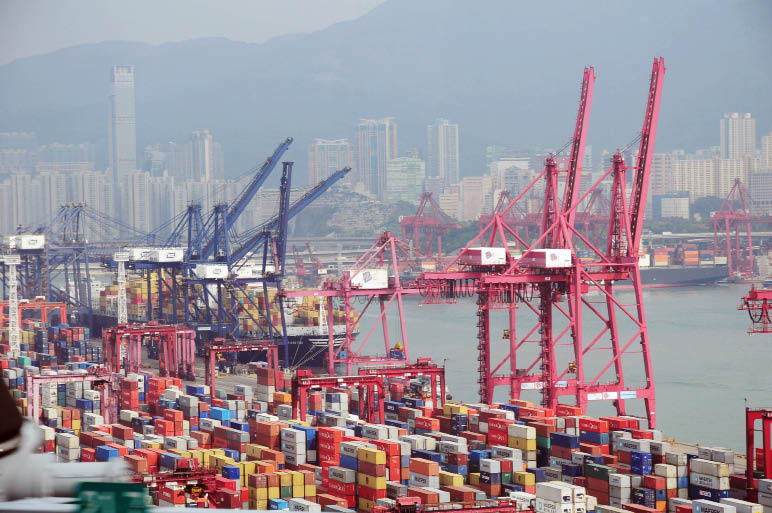Chinese Capital Oils World Economy
Chinese Capital Oils World Economy
By staff reporter JIAO FENG
INVESTMENT abroad by Chinese companies has been on the up for some time now, and totaled US $317.2 billion by the end of 2010. Investments continue to be made across the board in all kinds of industries. Chinese business interests are represented in 178 countries and regions worldwide.
According to statistics from the State Administration of Foreign Exchange (SAFE), around 65 percent of China's overseas investment was made through Hong Kong. This coastal enclave has become a key launching pad from which mainland companies expand to the global market.
It was in this context that the Hong Kong China Chamber of Commerce hosted the first China Overseas Investment Summit in November 2011. Participants in the event discussed the regrouping of global resources, China's overseas investment strategies and obstacles to development facing mainland companies.
|
 |
| The busy Kwai Chung Port in Hong Kong. |
A Helping Hand
The world economy has been in the doldrums since the financial crisis of 2008, and the recent EU sovereign debt crises have added yet more obstacles to recovery. Some economies now constitute credit risks and face increased costs of borrowing. The world's leading economies are plagued with high unemployment rates and working capital for their business is in short supply.
Amidst this gloom China's economic dynamism has continued to be a stabilizing force in global markets. According to the 2010 Statistical Bulletin of China's Outward Foreign Direct Investment, China's 2010 outward FDI net flow grew 21.7 percent over the previous year, accounting for 5.2 percent of the world total and placing China fifth globally, ahead of both Japan and the U.K.
This bulletin also records that China's FDI in major economies substantially increased in 2010 – more than US $5.96 billion are invested in the EU, doubling the 2009 figure; close to US $1.31 billion in the U.S., up 44 percent; US $568 million in Russia, up 63 percent, and US$ 338 million in Japan, trebling the 2009 amount. This flow of money from China creates jobs in these countries and adds tax revenues to government coffers. According to Zhang Xiaoqiang, deputy chief of the National Development and Reform Commission, at the end of 2010 Chinese-funded enterprises in countries other than China employed 1.1 million people, 800,000 of whom were local citizens. These companies are committed to local development, bringing benefits to local communities and fulfilling their social obligations. They provide free medical apparatuses and services, donate generously to local schools, and supply residents close to their base of operations with free water and electricity.
In 2008 Changsha Zoomlion Heavy Industry Science & Technology Development Co. acquired the Italian construction machinery maker Compagnia Italiana Forme Acciaio SpA, or CIFA.
No sooner was the purchase made than the financial crisis entered its first stage, forcing many transnational companies in Italy to trim their staff. Zoomlion, however, didn't sack a single Italian employee.
In the three years since, Zoomlion has grown into the world's leading concrete machinery manufacturer. CIFA was among the first of its European and American peers to recover from the economic crisis. In the first 10 months of 2011 CIFA reported business growth of 39 percent over the same period from 2010. In recognition of Zoomlion's contributions to the Italian economy, President Giorgio Napolitano awarded the 2010 Leonardo Award to Zhan Chunxin, chairman of Zoomlion.
In his speech to the China Overseas Investment Summit, Acting United States Consul General Matt Matthews confirmed that Chinese investment in the U.S. has grown dramatically. Between 2005 and 2010, China was the fastest-growing source of inbound US FDI, with its FDI stock in the country growing at 53 percent a year. Chinese firms have entered sectors such as telecommunications, industrial equipment, auto parts, hospitality, and energy. This influx of Chinese money provides American firms with desperately needed capital and helps them stay in business and keep their employees in work.
Chan King-wai, chairman of the Hong Kong China Chamber of Commerce and executive president of the first China Overseas Investment Summit, predicts that with the rehabilitation of the world economy the internationalization of labor and the continuing flow of industrial transfers will grow larger in scale. Capital allocation will take place within a global framework. The cross-border flows of factors of production such as capital, technology and personnel will pick up speed, and trade of and investment in related industries will undergo further expansion. These factors will open up more opportunities for expansion of businesses involved in international trade and investment. Riding high on the globalization trend, increasing numbers of Chinese firms are making direct investments on foreign soil and tapping into international factors of production in order to enhance their ability to compete on a global scale.
- Eco-agriculture and Eco-tourism Power Nanchang’s Green Development
- Balance Environmental Protection and Economic Prosperity – Nanchang Looks to European Technology for Green Development
- Sustainable Growth Requires Wiser Energy Use
- Chinese Economy: On the Path of Scientific Development
- China's Economy over the Last Ten Years
Services
Economy
- Eco-agriculture and Eco-tourism Power Nanchang’s Green Development
- Balance Environmental Protection and Economic Prosperity – Nanchang Looks to European Technology for Green Development
- Sustainable Growth Requires Wiser Energy Use
- Chinese Economy: On the Path of Scientific Development
- China's Economy over the Last Ten Years

